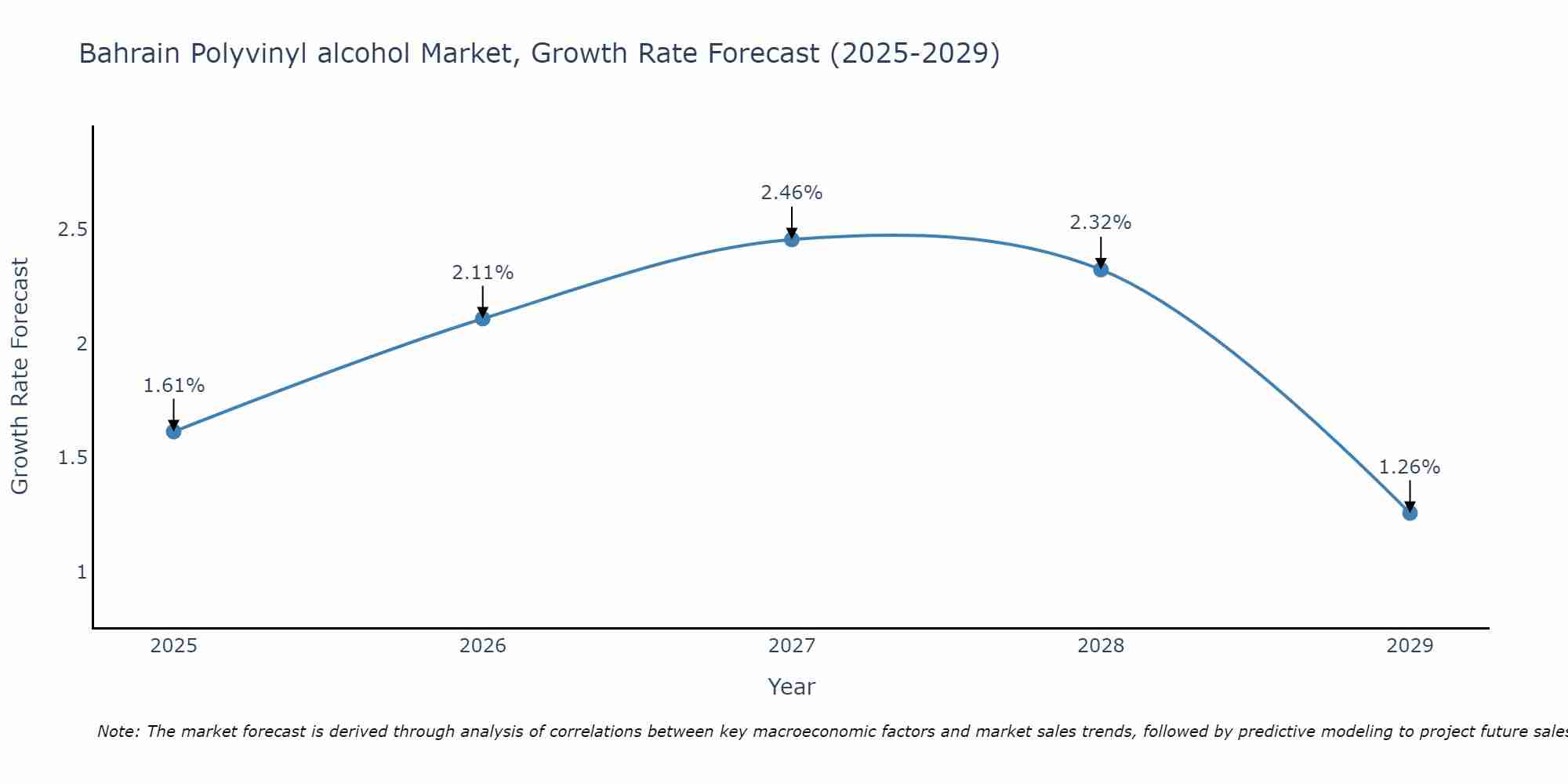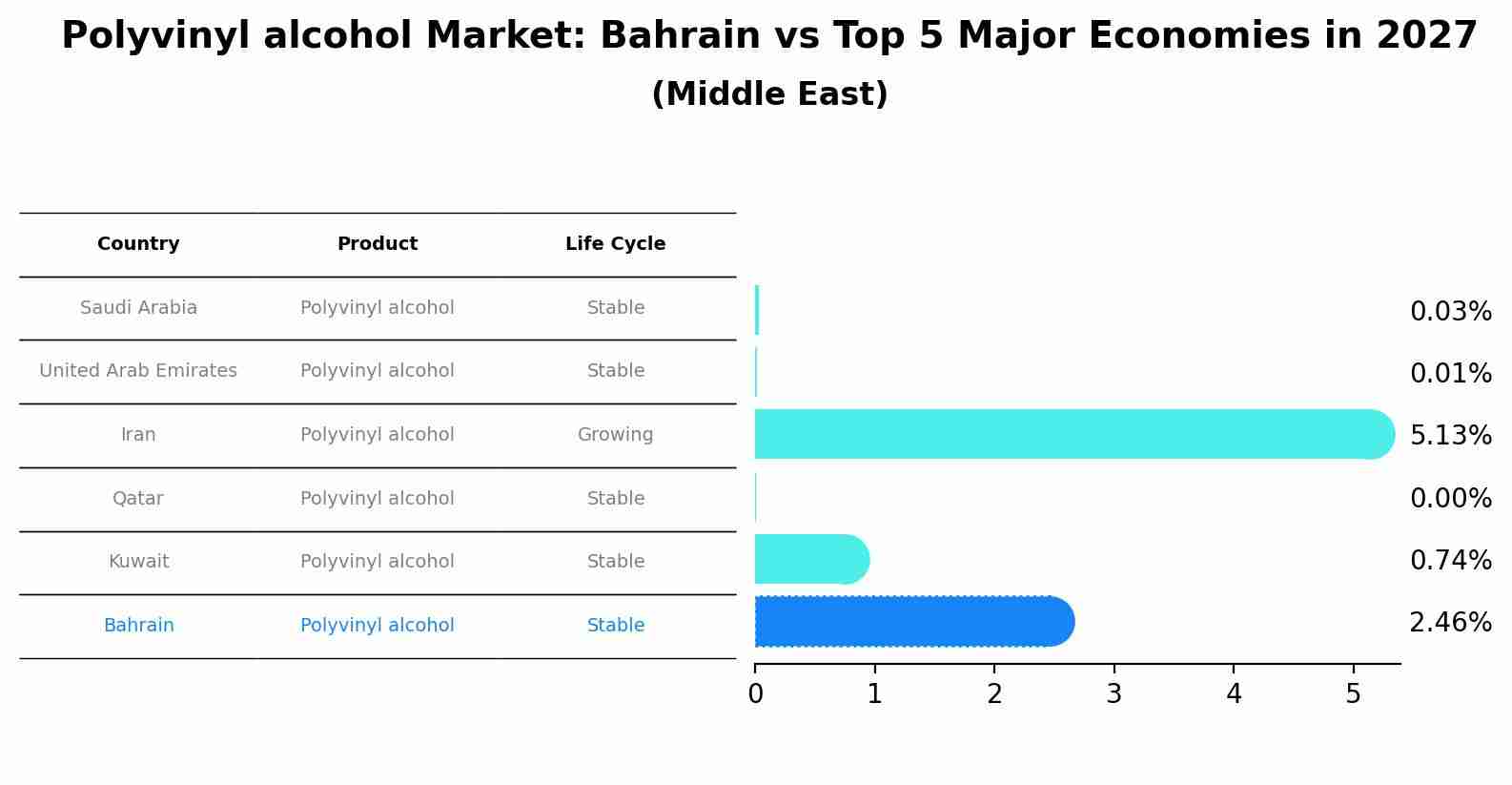Bahrain Polyvinyl alcohol Market (2025-2031) Outlook | Size, Forecast, Growth, Trends, Industry, Analysis, Revenue, Value, Companies & Share
| Product Code: ETC092103 | Publication Date: Jun 2021 | Updated Date: Apr 2025 | Product Type: Report | |
| Publisher: 6Wresearch | Author: Ravi Bhandari | No. of Pages: 70 | No. of Figures: 35 | No. of Tables: 5 |
Bahrain Polyvinyl alcohol Market Size Growth Rate
The Bahrain Polyvinyl alcohol Market is projected to witness mixed growth rate patterns during 2025 to 2029. Growth accelerates to 2.46% in 2027, following an initial rate of 1.61%, before easing to 1.26% at the end of the period.

Polyvinyl alcohol Market: Bahrain vs Top 5 Major Economies in 2027 (Middle East)
The Polyvinyl alcohol market in Bahrain is projected to grow at a stable growth rate of 2.46% by 2027, within the Middle East region led by Saudi Arabia, along with other countries like United Arab Emirates, Iran, Qatar and Kuwait, collectively shaping a dynamic and evolving market environment driven by innovation and increasing adoption of emerging technologies.

Bahrain Polyvinyl alcohol Market Overview
The polyvinyl alcohol (PVA) market in Bahrain is showing strong potential, driven by its wide-ranging applications in industries such as packaging, textiles, and adhesives. PVA is known for its excellent film-forming, adhesive, and emulsifying properties, making it highly desirable in the production of water-soluble films, textiles, and coatings. The demand for environmentally friendly and biodegradable packaging materials in Bahrain is also contributing to the growth of the PVA market. Moreover, the increasing need for high-performance textiles, including those used in clothing and industrial fabrics, further supports the demand for PVA. As businesses in Bahrain become more focused on sustainability and innovation, the market for polyvinyl alcohol is expected to continue growing in various industrial sectors.
Drivers of the market
The polyvinyl alcohol (PVA) market in Bahrain is driven by its use in industries such as packaging, textiles, and pharmaceuticals. PVA is widely used in the production of biodegradable packaging materials, which are gaining popularity as Bahrain adopts more sustainable practices. The growing demand for eco-friendly packaging solutions is boosting the PVA market. Additionally, PVA is used in adhesives, coatings, and textile processing, and the expansion of these industries in Bahrain is contributing to the market`s growth. The increasing focus on sustainability and the use of water-soluble, environmentally friendly materials is further fueling demand for PVA.
Challenges of the market
The polyvinyl alcohol (PVA) market in Bahrain, driven by its applications in textiles, adhesives, and packaging, faces challenges related to the fluctuating cost of raw materials, particularly vinyl acetate monomer (VAM). The production of PVA is energy-intensive, making it susceptible to energy price variations. Additionally, the market is influenced by environmental regulations concerning the use of synthetic polymers, as there is a growing demand for biodegradable and eco-friendly alternatives. Competition from other water-soluble polymers, such as polyvinylpyrrolidone (PVP), presents a further challenge to the PVA market.
Investment opportunities in the Market
Polyvinyl alcohol (PVA) is used in industries such as textiles, adhesives, and packaging. Investment opportunities in Bahrain include supplying PVA to manufacturers of textiles, coatings, and adhesives. With the increasing demand for water-soluble packaging and eco-friendly materials, investors can explore partnerships with local manufacturers to promote the use of PVA in environmentally conscious products.
Government Policy of the market
The polyvinyl alcohol market in Bahrain is driven by demand from industries such as textiles, paper, and adhesives. Government policies promoting industrial growth and diversification have contributed to the development of the polyvinyl alcohol market. Import regulations ensure that chemical products like polyvinyl alcohol meet international safety and environmental standards. Local initiatives aimed at promoting sustainable and advanced manufacturing processes have further supported the demand for polyvinyl alcohol in Bahrains industrial sectors.
Key Highlights of the Report:
- Bahrain Polyvinyl alcohol Market Outlook
- Market Size of Bahrain Polyvinyl alcohol Market, 2021
- Forecast of Bahrain Polyvinyl alcohol Market, 2031
- Historical Data and Forecast of Bahrain Polyvinyl alcohol Revenues & Volume for the Period 2021 - 2031
- Bahrain Polyvinyl alcohol Market Trend Evolution
- Bahrain Polyvinyl alcohol Market Drivers and Challenges
- Bahrain Polyvinyl alcohol Price Trends
- Bahrain Polyvinyl alcohol Porter's Five Forces
- Bahrain Polyvinyl alcohol Industry Life Cycle
- Historical Data and Forecast of Bahrain Polyvinyl alcohol Market Revenues & Volume By Grade for the Period 2021 - 2031
- Historical Data and Forecast of Bahrain Polyvinyl alcohol Market Revenues & Volume By Partially Hydrolyzed for the Period 2021 - 2031
- Historical Data and Forecast of Bahrain Polyvinyl alcohol Market Revenues & Volume By Fully Hydrolyzed for the Period 2021 - 2031
- Historical Data and Forecast of Bahrain Polyvinyl alcohol Market Revenues & Volume By End-use Industry for the Period 2021 - 2031
- Historical Data and Forecast of Bahrain Polyvinyl alcohol Market Revenues & Volume By Food Packaging for the Period 2021 - 2031
- Historical Data and Forecast of Bahrain Polyvinyl alcohol Market Revenues & Volume By Textile for the Period 2021 - 2031
- Historical Data and Forecast of Bahrain Polyvinyl alcohol Market Revenues & Volume By Paper for the Period 2021 - 2031
- Historical Data and Forecast of Bahrain Polyvinyl alcohol Market Revenues & Volume By Medical for the Period 2021 - 2031
- Historical Data and Forecast of Bahrain Polyvinyl alcohol Market Revenues & Volume By Construction for the Period 2021 - 2031
- Historical Data and Forecast of Bahrain Polyvinyl alcohol Market Revenues & Volume By Electronics for the Period 2021 - 2031
- Bahrain Polyvinyl alcohol Import Export Trade Statistics
- Market Opportunity Assessment By Grade
- Market Opportunity Assessment By End-use Industry
- Bahrain Polyvinyl alcohol Top Companies Market Share
- Bahrain Polyvinyl alcohol Competitive Benchmarking By Technical and Operational Parameters
- Bahrain Polyvinyl alcohol Company Profiles
- Bahrain Polyvinyl alcohol Key Strategic Recommendations
Frequently Asked Questions About the Market Study (FAQs):
- Single User License$ 1,995
- Department License$ 2,400
- Site License$ 3,120
- Global License$ 3,795
Search
Related Reports
- Australia IT Asset Disposal Market (2025-2031) | Strategy, Consumer Insights, Analysis, Investment Trends, Opportunities, Growth, Size, Share, Industry, Revenue, Segments, Value, Segmentation, Supply, Forecast, Restraints, Outlook, Competition, Drivers, Trends, Demand, Pricing Analysis, Competitive, Strategic Insights, Companies, Challenges
- UAE Building Thermal Insulation Market Outlook (2025-2031) | Revenue, Companies, Share, Trends, Growth, Size, Forecast, Industry, Analysis & Value
- Portugal Electronic Document Management Market (2025-2031) | Strategy, Consumer Insights, Analysis, Investment Trends, Opportunities, Growth, Size, Share, Industry, Revenue, Segments, Value, Segmentation, Supply, Forecast, Restraints, Outlook, Competition, Drivers, Trends, Demand, Pricing Analysis, Competitive, Strategic Insights, Companies, Challenges
- France Electronic Document Management Market (2025-2031) | Strategy, Consumer Insights, Analysis, Investment Trends, Opportunities, Growth, Size, Share, Industry, Revenue, Segments, Value, Segmentation, Supply, Forecast, Restraints, Outlook, Competition, Drivers, Trends, Demand, Pricing Analysis, Competitive, Strategic Insights, Companies, Challenges
- Portugal Occupational Health & Safety Services Market (2025-2031) | Strategy, Consumer Insights, Analysis, Investment Trends, Opportunities, Growth, Size, Share, Industry, Revenue, Segments, Value, Segmentation, Supply, Forecast, Restraints, Outlook, Competition, Drivers, Trends, Demand, Pricing Analysis, Competitive, Strategic Insights, Companies, Challenges
- Netherlands Occupational Health and Safety Services Market (2025-2031) | Strategy, Consumer Insights, Analysis, Investment Trends, Opportunities, Growth, Size, Share, Industry, Revenue, Segments, Value, Segmentation, Supply, Forecast, Restraints, Outlook, Competition, Drivers, Trends, Demand, Pricing Analysis, Competitive, Strategic Insights, Companies, Challenges
- Belgium and Luxembourg Facility Management Market (2025-2031) | Strategy, Consumer Insights, Analysis, Investment Trends, Opportunities, Growth, Size, Share, Industry, Revenue, Segments, Value, Segmentation, Supply, Forecast, Restraints, Outlook, Competition, Drivers, Trends, Demand, Pricing Analysis, Competitive, Strategic Insights, Companies, Challenges
- Russia Women Intimate Apparel Market (2025-2031) | Strategy, Consumer Insights, Analysis, Investment Trends, Opportunities, Growth, Size, Share, Industry, Revenue, Segments, Value, Segmentation, Supply, Forecast, Restraints, Outlook, Competition, Drivers, Trends, Demand, Pricing Analysis, Competitive, Strategic Insights, Companies, Challenges
- Africa Chocolate Market (2025-2031) | Size, Share, Trends, Growth, Revenue, Analysis, Forecast, industry & Outlook
- Global Hydroxychloroquine And Chloroquine Market (2025-2031) | Industry, Trends, Size, Outlook, Growth, Value, Companies, Revenue, Analysis, Share, Forecast
Industry Events and Analyst Meet
Our Clients
Whitepaper
- Middle East & Africa Commercial Security Market Click here to view more.
- Middle East & Africa Fire Safety Systems & Equipment Market Click here to view more.
- GCC Drone Market Click here to view more.
- Middle East Lighting Fixture Market Click here to view more.
- GCC Physical & Perimeter Security Market Click here to view more.
6WResearch In News
- Doha a strategic location for EV manufacturing hub: IPA Qatar
- Demand for luxury TVs surging in the GCC, says Samsung
- Empowering Growth: The Thriving Journey of Bangladesh’s Cable Industry
- Demand for luxury TVs surging in the GCC, says Samsung
- Video call with a traditional healer? Once unthinkable, it’s now common in South Africa
- Intelligent Buildings To Smooth GCC’s Path To Net Zero













